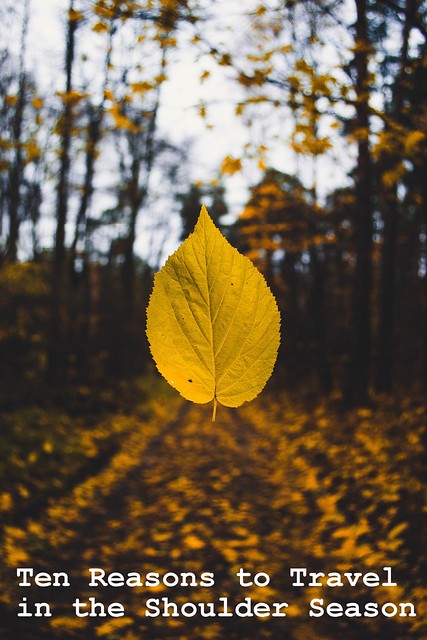Ten Reasons to Travel in the Shoulder Season
What's the shoulder season, you may ask? It's that sweet spot between high season and low. It's also a great price break from high season prices, and low season bargains. Travel+Leisure magazine has a great slideshow on Shoulder Season Travel Secrets, with details on places to go, when.
You may not want to travel during low season, due to weather issues (cold, monsoons, etc.). We traveled to Scotland and Ireland last September, and missed the crowds, spent less, and had gorgeous weather. You'll never miss shoulder season - it's always on, somewhere in the world. Try it!
Here are our Top Ten Reasons to travel in the Shoulder Season:

1. It's cheaper. You'll find that accommodations and airfare are much less during the shoulder season, for whatever destination you're headed to. Take advantage of this and find cheaper airfare, and often up to half off accommodations (hotels and rental homes). Check out FareCompare for airfare predictions. Research Tourism or Destination offices for deals. And read our tips for saving money on flights - you may be surprised!
2. Less tourists. Most of the tourists head to a place RIGHT when it is busiest. That means long lines, making reservations months ahead for restaurants, and being crowded. Cruise ships fill the harbors. When you travel in the shoulder season, there will still be some travelers visiting, but not as many.
3. Friendlier locals. When the high season is over, the locals come back out to play. You'll see where they love to eat and play, and can follow in their footsteps. Strike up a conversation, and ask what they recommend. As one who grew up near a very famous beach, I LOVE it when September rolls around and the tourists leave.
Oval Beach, Saugatuck, Michigan
4. More cultural events. Once the high season is over, things spring back into place. This includes theater, music, and events. Operas start up their new season. Theaters get down to business. The local music scene picks right back up, after offering more generic, tourist-friendly music in the summer. You'll be amazed at the diversity of cultural offerings in the shoulder season. Make plans to visit Barcelona for the International Jazz Festival, Oktoberfest in Germany, or the International Contemporary Art Fair in Lisbon. Look online, at local papers, and ask around.

Eiffel Tower
5. Attractions aren't crowded. You'll be able to actually SEE the Mona Lisa at the Louvre, head through Rome's Forum without jostling, visit Westminster Cathedral and the British Museum easily. Please note that some attractions will have shorter hours, to reflect the lack of crowds. If it's an outdoor attraction, be sure to take an umbrella and jacket.
Gap of Dunloe, Ireland
6. Nature at its best. In Buenos Aires, the jacarandas bloom in November - but most people travel there at different times, missing it. In Thailand in November, the wet season is nearing a close and you can see beauty both on land and in the clear sea water when you dive and snorkel. In Cape Town, September is ideal for whale-watching. In the spring, see the beautiful tulip fields in Holland. View the midnight sun in Scandinavia in early summer, and pick berries in September. In early fall in Africa, you can catch the end of the Great Migration without the (human) crowds. In the Azores, you can snag great diving deals - as cheap as $30 a dive (Nov-Mar). In Trinidad & Tobago, late spring is turtle hatching season - you can volunteer to help! Foggy fall nights in Prague just add to the mystery and beauty of such an extraordinary place.
The beach at our rental home, County Kerry, Ireland
7. Better weather. I don't do hot. I like to travel when the air is clear and I can enjoy myself outside. Those 100 degree days just don't do it for me. So, traveling in the shoulder season makes it much easier for me. I might have to pack a few more layers, and an umbrella, but I can actually enjoy myself outside instead of huddling inside in the AC, trying not to pass out. Try visiting LA in the fall - less smog, still lovely temps (70s), and beautiful views.
Mallaig Harbor, Scotland
8. Avoid local crowds/holidays. Sure, you might think that August in Europe would be ideal - but think again. Everyone in Europe goes on vacation in August. Places are closed, hotels are overbooked, beaches are packed. Head there in September, when the crowds clear out, the attractions become open again because people have come home, and the locals are relaxed from their own vacations! Check the local holidays before you book - from Golden Week in Japan to Catholic holidays in Europe - definitely crowds (and prices) to avoid.
Walking Bridge, Inverness, Scotland
9. Special events. Some major cultural and educational events occur during the shoulder seasons. For instance, Charleston has its 35th annual Fall tours of homes and gardens, September 22 - October 23, 2011. This is a chance to visit gardens and architecturally significant homes, churches, and public buildings - and it only happens once a year, during the shoulder season! In Austria in November, try the Heurige - a new wine that is available to drink for only a few weeks after the harvest. Take your kids to the story hour at the local library where you're staying - especially if it's in a different language!
Sneem, County Kerry, Ireland
10. You're happier. Everything's fallen into place - you've spent much less on your travels, have been able to live like (and interact with) locals, seen the attractions without the crowds, and have experienced the essence of place without all the hassles.





















